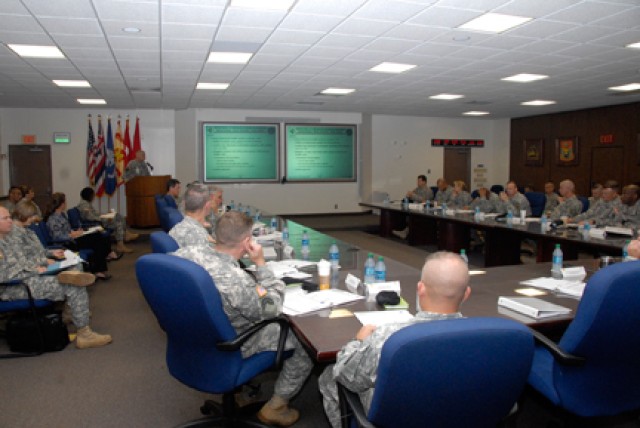SCHOFIELD BARRACKS, Hawaii - Behavioral health services for Soldiers were among the topics discussed at a U.S. Army Garrison-Hawaii-sponsored meeting, Jan. 4, here.
The Community Health Promotion Council safeguards human health, improves the quality of life and enhances the natural environment for joint warfighters, their families and the military community. It was hosted by Col. Douglas Mulbury, commander, USAG-HI, and chaired by Maj. Gen. Michael J. Terry, in his role as Army Hawaii's senior commander.
Terry thanked the senior leaders for ensuring that Hawaii's Soldiers and families remained safe during the holidays.
"(There was) a lot of leadership involvement during the holidays, and getting out there and getting into what's going on with our Soldiers and families," Terry said.
Col. C.J. Diebold, chief, Department of Psychiatry, Tripler Army Medical Center, and psychiatry consultant to the Army Surgeon General, discussed ways to help combat the perceived stigma associated with seeking behavioral health, or BH, services.
He said the stigma has been around for a number of years. Many Soldiers think that seeking BH services is a sign of weakness and that they will be ostracized by their peers. The civilian sector also shares that perception.
Diebold, who has been an Army psychiatrist for 20 years, said the military BH community has learned that leaders have a big role in helping combat the stigma attached to seeking help for behavioral issues and ensuring Soldiers keep BH appointments.
Due to increased leadership involvement, no-show rates since June 2010 have dropped from "almost 50 percent to less than 10 percent now," according to Brig. Gen. Keith Gallagher, commander, TAMC. Gallagher said that the key to decreasing the no-show rate is involved leaders.
TAMC and the Schofield Barracks Health Clinic staff continue to improve and add to BH services.
"One of the big things we're doing is bringing behavioral health services into primary care," Diebold said.
Soldiers may feel more comfortable speaking with their primary care providers, thus negating any concerns over being seen going to a BH clinic. Soldiers can be seen quickly, referrals to specialty clinic aren't needed and Soldiers consult directly with primary care providers.
Primary care-based BH programs at Schofield Barracks include Respect-Mil, an Armywide program where medical staff are trained in BH screening and treatment, and each Soldier is screened for depression and post-traumatic stress disorder. Complicated cases are referred to the BH clinic.
Diebold also said that TAMC is providing better care of depression. BH providers are embedded in Family Medicine, Internal Medicine and OB/GYN Clinics. The initiative streamlines screening and treatment of Soldiers, and will be expanded to family members to emphasize healthy and resilient relationships.
Another BH pathway is the Soldier Assistance Center at Schofield Barracks. Services include suicide prevention and awareness training. Soldiers can participate in post-deployment stress and anger management groups or pursue individual therapy.
TAMC's Department of Psychology also offers programs that promote healthy lifestyles, to include weight reduction and smoking cessation, and directly supports the Army's initiative of Comprehensive Soldier Fitness.
The Confidential Alcohol Treatment and Education Program is another BH program at Schofield Barracks. One of the Army's three pilot sites, the Schofield Barracks program encourages Soldiers to self-refer, with the option of command involvement, if Soldiers meet the criteria for the program. The program offers increased privacy, with available evening hours. Diebold added that more officers and senior noncommissioned officers are self-referring.
Also, Tripler will get a tele-health cell in the near future. Diebold said that Soldiers are comfortable with tele-health, a technology that is similar to Skype video chat. A similar program to serve family members is currently under development.




Social Sharing